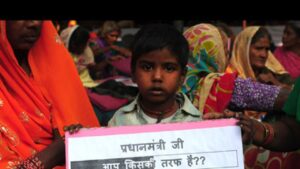36 years of Bhopal Gas Tragedy: Victims’ battle for justice continues

Toxic methyl isocyanate released from the Union Carbide pesticide factory reportedly killed 3,500 people in the central Indian city
The residents of JP Nagar have no way to escape the ghosts of their past. The ramshackle neighbourhood, on the outskirts of Bhopal, stands just metres away from the chemical factory where an explosion occurred just after midnight on December 2, 1984, and poisoned their lives forever.
Over 40 tonnes of methyl isocyanate, a highly poisonous gas, leaked from the Union Carbide pesticide factory and reportedly killed over 3,500 people in the central Indian city instantly and affected more than a million others in the years that followed. The total death tally is also expected to be 15,000-20,000 deaths.
Relatives of the victims, activists and NGOs that have been striving for over three and a half decades to bring the victims’ lives back on track, accuse the government of abandoning them and withholding treatment.
Sambhavna, a clinic run by a trust for treatment of Bhopal gas tragedy survivors, has claimed that the most causalities of the Covid-19 pandemic are those who were also victims of the gas leak. “They are suffering from obesity and thyroid disorders that are also responsible for a host of other ailments. The victims make for a significant proportion of coronavirus deaths in Bhopal,” a doctor working at the clinic tells Media India Group.
Four organisations working for justice to survivors of the tragedy have demanded that Union Carbide and Dow Chemical, that acquired Union Carbide in 2001, spay additional compensation for the long term injuries caused to the survivors who were exposed to the gas as evidenced during the current Covid-19 pandemic.
“Official records suggest that Covid-19 death rate in the gas exposed population is 6.5 times more than that of the non-gas exposed population of the Bhopal district,” four organisations including Bhopal Gas Peedit Mahila Stationery Karmchari Sangh, Bhopal Gas Peedit Mahila Purush Sangharsh Morcha, Bhopal Group for Information & Action and Children Against Dow Carbide said in a joint statement.
“The pandemic has exposed the official lie that 93 pc of those exposed to Union Carbide’s poisonous gases had only temporary injuries,” Rashida Bee, president of the Bhopal Gas Peedit Mahila Karmchari Sangh told Media India Group.
Nawab Khan, president of another organisation Bhopal Gas Peedit Sangarsh Morcha, says “We have official records that show that the gas exposed population, that is 17 pc of the district’s population of 2.8 million, has contributed to 56 pc of the Covid-19 deaths in the district so far. It is time the Indian government presented these data and other hospital records before the Supreme Court that is yet to hear the Curative Petition for additional compensation for damage caused by the December 1984 disaster.”
Union Carbide’s own documents state that the injuries caused by exposure to Methyl Isocyanate are permanent in nature and yet more than 90 pc of the victims have only been paid USD 500 compensation, which is for temporary injuries.
“Dow Chemicals continues to evade the pending civil, criminal and environmental liabilities of Union Carbide in Bhopal,” Nausheen Khan of Children Against Dow Carbide tells Media India Group.

Activists allege that there has been a deliberate suppression by the Indian government research which proves the long term systemic damage caused by the gas explosion
Activists allege that there has been a deliberate suppression by the Indian government of any research which proves the long term systemic or genetic damage caused by the gas explosion, to protect the corporations involved. Proof of the lasting damage of the gas exposure could have major legal implications for Union Carbide and its current owner Dow Chemicals, who took ownership of the company and its legal responsibilities in 2001, in terms of compensation liability.
“A recent study authorised by government medical body the Indian Council for Medical Research (ICMR), found that between 2016-2017, 9 pc of the babies born to gas-exposed mothers had birth defects compared to 1.3 pc born to mothers with no exposure. However, the study was subsequently discredited by the ICMR, who ordered it not to be published or disclosed,” reads a report by International Campaign for Justice in Bhopal, a coalition of various NGOs working with survivors of the disaster as well as human rights groups and international volunteers.
On the occasion of Anti-Corporate day, to mark the 36th anniversary of the disaster, there is nothing for the survivors and their kin to look forward to. The pandemic has worsened the already devastated state of treatment, compensation and healthcare for the victims.
The blackened ruins of the Union Carbide plant still loom untouched behind the factory walls where children with special needs play and their parents, grandparents and elders still await justice.










